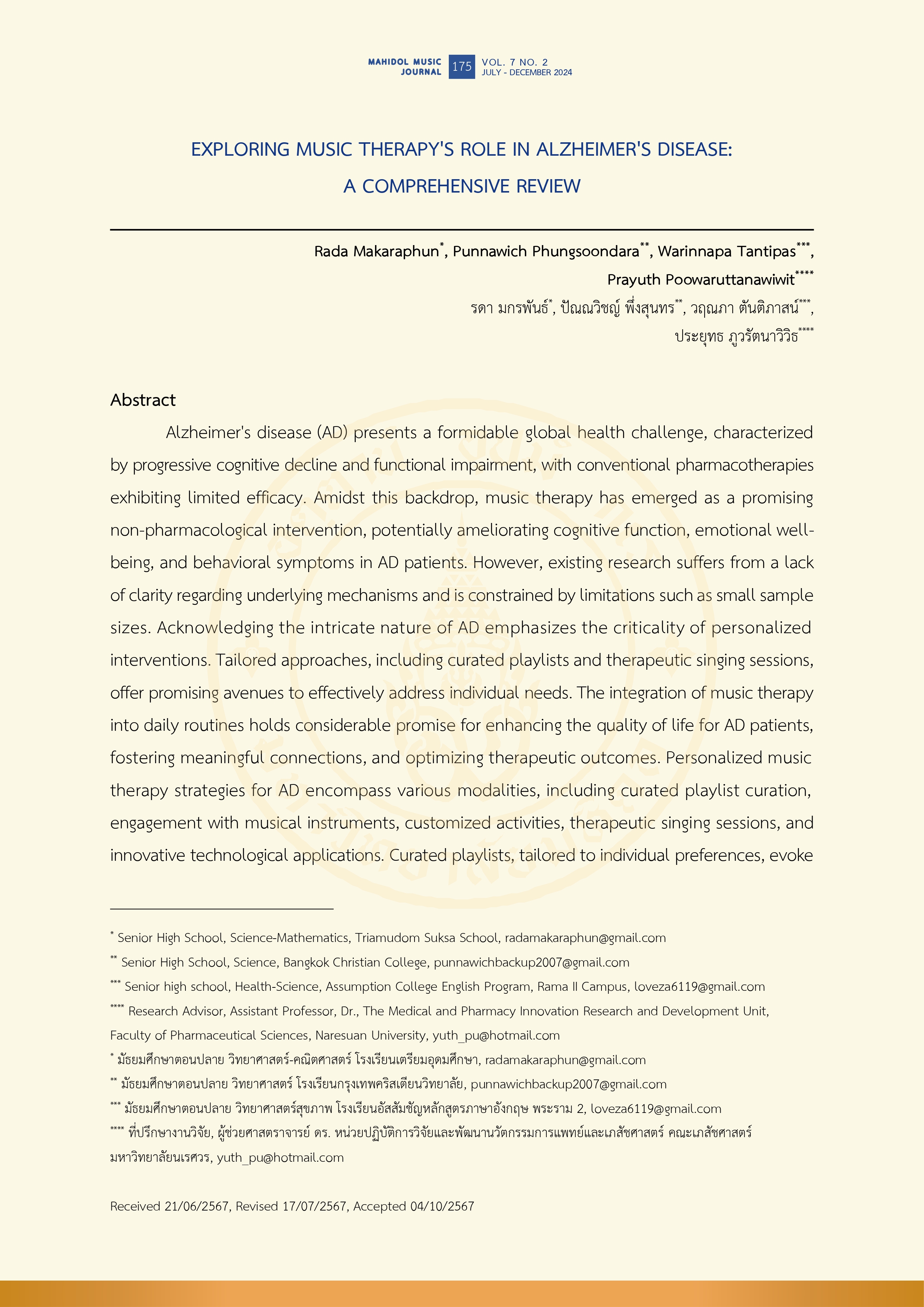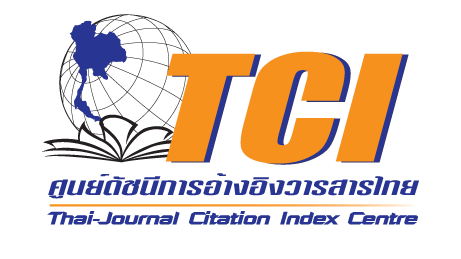EXPLORING MUSIC THERAPY'S ROLE IN ALZHEIMER'S DISEASE: A COMPREHENSIVE REVIEW
Keywords:
Alzheimer Disease, Music Therapy, Quality of Life, Personalized MedicineAbstract
Alzheimer's disease (AD) presents a formidable global health challenge, characterized by progressive cognitive decline and functional impairment, with conventional pharmacotherapies exhibiting limited efficacy. Amidst this backdrop, music therapy has emerged as a promising non-pharmacological intervention, potentially ameliorating cognitive function, emotional well-being, and behavioral symptoms in AD patients. However, existing research suffers from a lack of clarity regarding underlying mechanisms and is constrained by limitations such as small sample sizes. Acknowledging the intricate nature of AD emphasizes the criticality of personalized interventions. Tailored approaches, including curated playlists and therapeutic singing sessions, offer promising avenues to effectively address individual needs. The integration of music therapy into daily routines holds considerable promise for enhancing the quality of life for AD patients, fostering meaningful connections, and optimizing therapeutic outcomes. Personalized music therapy strategies for AD encompass various modalities, including curated playlist curation, engagement with musical instruments, customized activities, therapeutic singing sessions, and innovative technological applications. Curated playlists, tailored to individual preferences, evoke positive memories, and provide comfort, while engagement with musical instruments stimulates cognitive functions and fine motor skills. Tailored activities offer cognitive stimulation and mood enhancement, promoting a sense of community. Therapeutic singing sessions facilitate emotional expression and communication. Innovative technologies, such as music therapy apps and virtual reality platforms, offer immersive experiences and relaxation. Integrating these strategies into caregiving routines is paramount for improving the well-being of AD patients, underscoring the significance of personalized interventions in addressing the multifaceted challenges associated with the disease.
References
Abdul, Qudeer Ahmed, Byung Pal Yu, Hae Young Chung, Hyun Ah Jung, and Jae Sue Choi. "Epigenetic Modifications of Gene Expression by Lifestyle and Environment." Archives of Phamacal Research 40, no. 11 (2017): 1219-1237. https://doi.org/10.1007/s12272-017-0973-3.
Abubakar, Murtala Bello, Kamaldeen Olalekan Sanusi, Azizah Ugusman, Wael Mohamed, Haziq Kamal, Nurul Husna Ibrahim, Ching Soong Khoo, and Jaya Kumar. "Alzheimer's Disease: An Update and insights into Pathophysiology." Frontier in Aging Neuriscience 14 (2022): 742408. https://doi.org/10.3389/fnagi.2022.742408.
Baker. Felicity A, Young-Eun C Lee, Tanara Vieira Sousa, Phoebe A Stretton-Smith, Jeanette Tamplin, Vigdis Sveinsdottir, Monika Geretsegger, Jo Dugstad Wake, Jörg Assmus, and Christian Gold. “Clinical Effectiveness of Music Interventions for Dementia and Depression in Elderly Care (MIDDEL): Australian Cohort of an International Pragmatic Cluster-randomised Controlled Trial.” The Lancet Healthy Longevity 3, no. 3 (2022): e153-e165. https://doi.org/10.1016/S2666-7568(22)00027-7.
Baker, Felicity Anne, Vanessa Pac Soo, Jodie Bloska, Laura Blauth, Anna A. Bukowska, Libby Flynn, Ming Hung Hsu et al. “Home-based Family Caregiver-delivered Music and Reading Interventions for People Living with Dementia (HOMESIDE trial): An International Randomised Controlled Trial.” eClinicalMedicine 65 (2023): 102224. https://doi.org/10.1016/j.eclinm.2023.102224.
Baroni Caramel, Vanusa M., Jenny T. van der Steen, Annemieke C. Vink, Sarah I. M. Janus, Jos W. R. Twisk, Erik J. A. Scherder, and Sytse U. Zuidema. “The Effects of Individual Music Therapy in Nursing Home Residents with Dementia to Improve General Well-being: Study Protocol of a Randomized Controlled Trial.” BMC Geriatrics 24 (2024): 290. https://doi.org/10.1186/s12877-024-04863-z.
Bleibel, Malak, Ali El Cheikh, Najwane Said Sadier, and Linda Abou-Abbas. “The Effect of Music Therapy on Cognitive Functions in Patients with Alzheimer’s Disease: A Systematic Review of Randomized Controlled Trials.” Alzheimer’s Research & Therapy 15 (2023): 65. https://doi.org/10.1186/s13195-023-01214-9.
Brown, Jane A., and Gavin M. Bidelman. “Familiarity of Background Music Modulates the Cortical Tracking of Target Speech at the ‘Cocktail Party.’” Brain Sciences 12, no. 10 (2022): 1320. https://doi.org/10.3390/brainsci12101320.
Derks-Dijkman, Marije W., Rebecca S. Schaefer, and Roy P. C. Kessels. “Musical Mnemonics in Cognitively Unimpaired Individuals and Individuals with Alzheimer’s Dementia: A Systematic Review.” Neuropsychology Review 34, no. 2 (2024): 455-477. https://doi.org/10.1007/s11065-023-09585-4.
Garrido, Marta I, Elise G Rowe, Veronika Halász, and Jason B Mattingley. “Bayesian Mapping Reveals That Attention Boosts Neural Responses to Predicted and Unpredicted Stimuli.” Cerebral Cortex 28, no. 5 (2018): 1771-1782. https://doi.org/10.1093/cercor/bhx087.
Gómez Gallego, M., and J. Gómez García. “Musicoterapia En La Enfermedad de Alzheimer: Efectos Cognitivos, Psicológicos Y Conductuales.” Neurología 32, no. 5 (2017): 300-308. https://doi.org/10.1016/j.nrl.2015.12.003.
Gómez-Gallego, María, Juan Cándido Gómez-Gallego, María Gallego-Mellado, and Javier García-García. “Comparative Efficacy of Active Group Music Intervention versus Group Music Listening in Alzheimer’s Disease.” International Journal of Environmental Research and Public Health 18, no. 15 (2021): 8067. https://doi.org/10.3390/ijerph18158067.
Hosseini, Seyede Atefe, Rezvan Mohammadi, Somaye Noruzi, Yousef Mohamadi, Mitra Azizian, Seyed Mojta Mousavy, Faezeh Ghasemi et al. “Stem Cell- and Gene-Based Therapies as Potential Candidates in Alzheimer’s Therapy.” Journal of Cellular Biochemistry 119, no. 11 (2018): 8723-8736. https://doi.org/10.1002/jcb.27202.
Jiménez-Palomares, María, Elisa María Garrido-Ardila, Elena Chávez-Bravo, Silvia Teresa Torres-Piles, Blanca González-Sánchez, María Jesús Rodríguez-Mansilla, Álvaro De Toro-García, and Juan Rodríguez-Mansilla. “Benefits of Music Therapy in the Cognitive Impairments of Alzheimer’s-Type Dementia: A Systematic Review.” Journal of Clinical Medicine 13, no. 7 (2024): 2042. https://doi.org/10.3390/jcm13072042.
Kumar, Anil, Jaskirat Sidhu, Forshing Lui, and Jack W. Tsao. Alzheimer Disease. Treasure Island, FL: StatPearls Publishing, 2022. https://www.ncbi.nlm.nih.gov/books/NBK499922/.
Matziorinis, Anna Maria, and Stefan Koelsch. “The Promise of Music Therapy for Alzheimer’s Disease: A Review.” Annals of the New York Academy of Sciences 1516, no. 1 (2022): 11-17. https://doi.org/10.1111/nyas.14864.
Migliore, Lucia, and Fabio Coppedè. “Gene–Environment Interactions in Alzheimer Disease: The Emerging Role of Epigenetics.” Nature Reviews Neurology 18, no. 11 (2022): 643-660. https://doi.org/10.1038/s41582-022-00714-w.
Popa, Laura-Cristina, Mihnea Costin Manea, Diana Velcea, Ion Șalapa, Mirela Manea, and Adela Magdalena Ciobanu. “Impact of Alzheimer’s Dementia on Caregivers and Quality Improvement through Art and Music Therapy.” Healthcare 9, no. 6 (2021): 698. https://doi.org/10.3390/healthcare9060698.
Rajah Kumaran, Kesevan, Suleiman Yunusa, Enoch Perimal, Habibah Wahab, Christian P. Müller, and Zurina Hassan. “Insights into the Pathophysiology of Alzheimer’s Disease and Potential Therapeutic Targets: A Current Perspective.” Journal of Alzheimer’s Disease 91, no. 2 (2023): 507-530. https://doi.org/10.3233/jad-220666.
Ratovohery, Stéphie, Alexia Baudouin, Juliette Palisson, Didier Maillet, Olivier Bailon, Catherine Belin, and Pauline Narme. “Music as a Mnemonic Strategy to Mitigate Verbal Episodic Memory in Alzheimer’s Disease: Does Musical Valence Matter?” Journal of Clinical and Experimental Neuropsychology 41, no. 10 (2019): 1060-1073. https://doi.org/10.1080/13803395.2019.1650897.
Simmons-Stern, Nicholas R., Andrew E. Budson, and Brandon A. Ally. “Music as a Memory Enhancer in Patients with Alzheimer’s Disease.” Neuropsychologia 48, no. 10 (2010): 3164-3167. https://doi.org/10.1016/j.neuropsychologia.2010.04.033.
Sun, Bing, Jun Sun, Wayne Koh, and Jie Shi. “Neural Network Semantic Backdoor Detection and Mitigation: A Causality-Based Approach.” In Proceedings of the 33rd USENIX Security Symposium, Philadelphia, PA, August 14-16, 2024.
Sung, Huei-chuan, and Anne M Chang. “Use of Preferred Music to Decrease Agitated Behaviours in Older People with Dementia: A Review of the Literature.” Journal of Clinical Nursing 14, no. 9 (2005): 1133-1140. https://doi.org/10.1111/j.1365-2702.2005.01218.x.
Ting, Berne, Daniel Tzu-Li Chen, Wei-Ti Hsu, Chia-Lin Tsai, Ikbal Andrian Malau, Sheau-Ling Lee, and Li Jingling. “Multifaceted Music Therapy for Depression in Dementia: A Network Meta-Analysis of Randomized Controlled Trials.” European Journal of Investigation in Health, Psychology and Education 14, no. 2 (2024): 351-367. https://doi.org/10.3390/ejihpe14020024.
Tiwari, Sneham, Venkata Atluri, Ajeet Kaushik, Adriana Yndart, and Madhavan Nair. “Alzheimer’s Disease: Pathogenesis, Diagnostics, and Therapeutics.” International Journal of Nanomedicine 14 (2019): 5541-5554. https://doi.org/10.2147/ijn.s200490.
Wang, Yao, Tianru Zheng, Yanhong Liao, Li Li, and Yun Zhang. “A Meta-analysis of The Effect of Music Therapy on Alzheimer’s Disease.” International Journal of Clinical and Experimental Medicine 13, no. 2 (2020): 317-329. IJCEM.

Downloads
Published
How to Cite
Issue
Section
License
Copyright (c) 2024 College of Music

This work is licensed under a Creative Commons Attribution-NonCommercial-NoDerivatives 4.0 International License.
The copyright of the article belongs to the author. Published articles represent the views of the authors. The editorial team neither necessarily agree with nor take any responsibility for the article.





